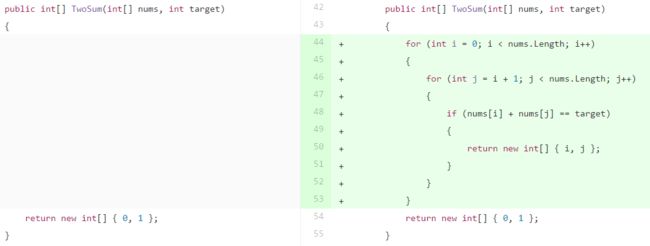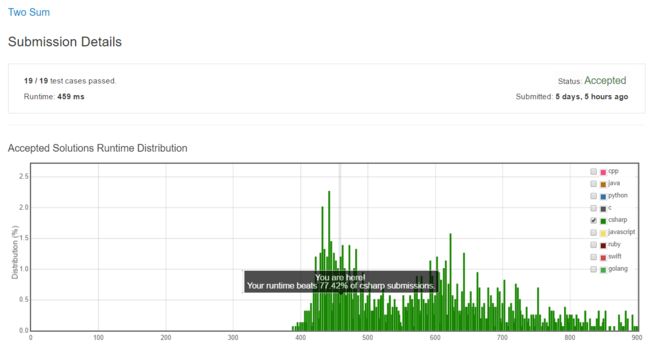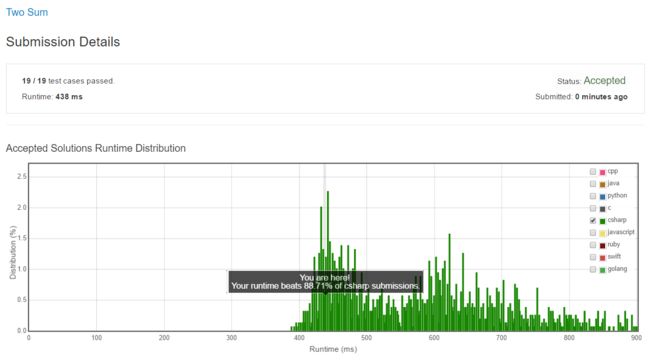LeetCode 的第 1 題 "Two Sum",題目描述如下。
LeetCode 第一題題目解釋:給一整數陣列 nums 與一整數 target,假設剛好有一對 nums[i] + nums[j] == target,回傳 int[]{ i, j }
Step 1, 新增失敗測試用例,Test_nums_is_1_8_and_target_is_9_should_return_0_1
測試用例代表性:最單純的情境,
nums長度為 2,結果為 {0, 1}
測試代碼:
[TestMethod]
public void Test_nums_is_1_8_and_target_is_9_should_return_0_1()
{
var sut = new Solution();
var nums = new int[] { 1, 8 };
var target = 9;
var expected = new int[] { 0, 1 };
var actual = sut.TwoSum(nums, target);
CollectionAssert.AreEqual(expected, actual);
}
hard-code 以通過測試的生產代碼:
public class Solution
{
public int[] TwoSum(int[] nums, int target)
{
return new int[] { 0, 1 };
}
}
Step 2, 重構測試程式,擷取出 TwoSum() 與 ShouldEqual() 兩個方法
[TestClass]
public class UnitTest1
{
[TestMethod]
public void Test_nums_is_1_8_and_target_is_9_should_return_0_1()
{
var nums = new int[] { 1, 8 };
var actual = TwoSum(nums, 9);
var expected = new int[] { 0, 1 };
ShouldEqual(expected, actual);
}
private static int[] TwoSum(int[] nums, int target)
{
var actual = new Solution().TwoSum(nums, target);
return actual;
}
private static void ShouldEqual(int[] expected, int[] actual)
{
CollectionAssert.AreEqual(expected, actual);
}
}
Step 3, 新增失敗測試用例,Test_nums_is_1_2_4_and_target_is_5_should_return_0_2
測試用例代表性:
nums長度為 3,符合條件的結果為 {0,2}
測試代碼:
[TestMethod]
public void Test_nums_is_1_2_4_and_target_is_5_should_return_0_2()
{
var nums = new int[] {1, 2, 4};
var actual = TwoSum(nums, 5);
var expected = new int[] {0, 2};
ShouldEqual(expected, actual);
}
Step 4, 使用雙層迴圈直接找到 nums[i] + nums[j] == target 的組合
第二層迴圈 index 從
i + 1開始
生產代碼差異:
到這邊就滿足所有功能性的需求,但演算法的效率是最差的。
Step 5, 重構演算法,先排序,以減少第二層迴圈巡覽次數
原需求為找到
nums[i] + nums[j] == target,當先排序之後(OrderBy默認為 quick sort),第二層迴圈如果出現nums[i] + nums[j] > target時,代表第二層迴圈不用比了,該回到第一個迴圈繼續往後巡覽。
生產代碼如下:
public int[] TwoSum(int[] nums, int target)
{
var sorted = nums
.Select((x, index) => Tuple.Create(x, index))
.OrderBy(x => x.Item1).ToArray();
for (int i = 0; i < sorted.Length; i++)
{
for (int j = i + 1; j < sorted.Length; j++)
{
var twoSum = sorted[i].Item1 + sorted[j].Item1;
if (twoSum == target)
{
return new int[] { Math.Min(sorted[i].Item2, sorted[j].Item2), Math.Max(sorted[i].Item2, sorted[j].Item2) };
}
if (twoSum > target)
{
break;
}
}
}
return null;
}
到這邊已經能通過 LeetCode 的所有測試案例。
Step 6, 重構演算法,不用兩層迴圈
要找到
nums[i] + nums[j] == target,可以針對原本的nums集合排序後,設定 start 與 end 兩個 index flag,若nums[start] + nums[end] > target,代表 end flag 要往回退。若nums[start] + nums[end] < target則代表 start flag 要往前走。直到找到nums[i] + nums[j] == target為止。
生產代碼:
public int[] TwoSum(int[] nums, int target)
{
var sorted = nums
.Select((x, index) => Tuple.Create(x, index))
.OrderBy(x => x.Item1).ToArray();
var start = 0;
var end = sorted.Length - 1;
while (start < end)
{
if (sorted[start].Item1 + sorted[end].Item1 == target)
{
return new int[] { Math.Min(sorted[start].Item2, sorted[end].Item2), Math.Max(sorted[start].Item2, sorted[end].Item2) };
}
else if (sorted[start].Item1 + sorted[end].Item1 < target)
{
start++;
}
else
{
end--;
}
}
return null;
}
通過 LeetCode 所有測試用例
更新1: 改以 Dictionary 存放巡覽過的值,只需一次迴圈
生產代碼:
public int[] TwoSum(int[] nums, int target)
{
var dictionary = new Dictionary();
for (int i = 0; i < nums.Length; i++)
{
var key = target - nums[i];
if (dictionary.ContainsKey(key))
{
return new int[] { dictionary[key], i };
}
else if (!dictionary.ContainsKey(nums[i]))
{
dictionary.Add(nums[i], i);
}
}
return null;
}
Reference
GitHub commit history: LeetCode_1_two_sum



